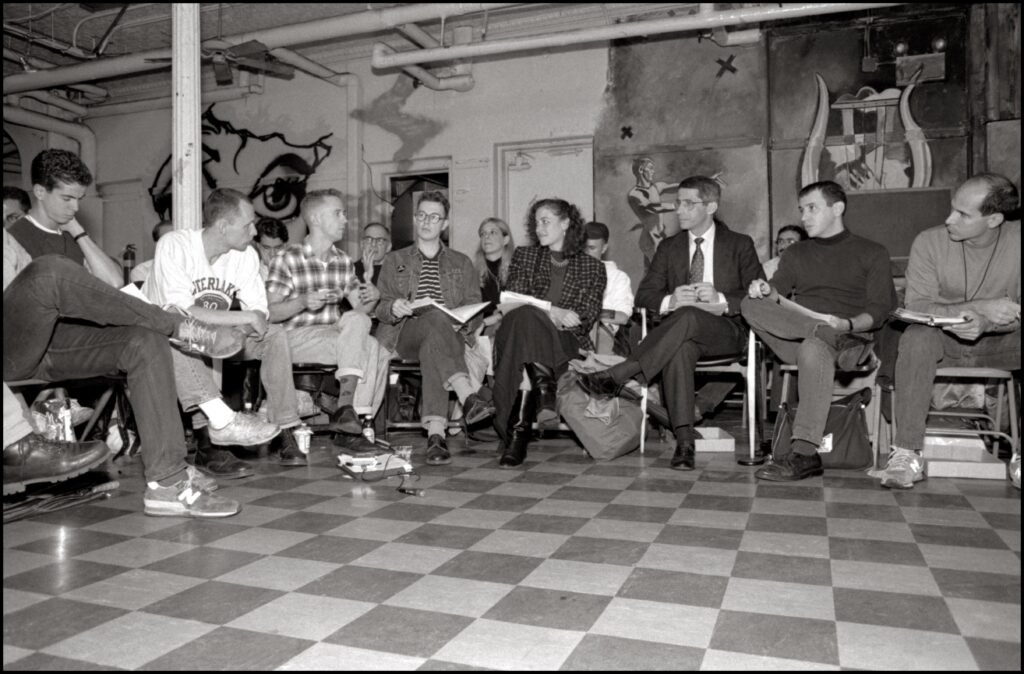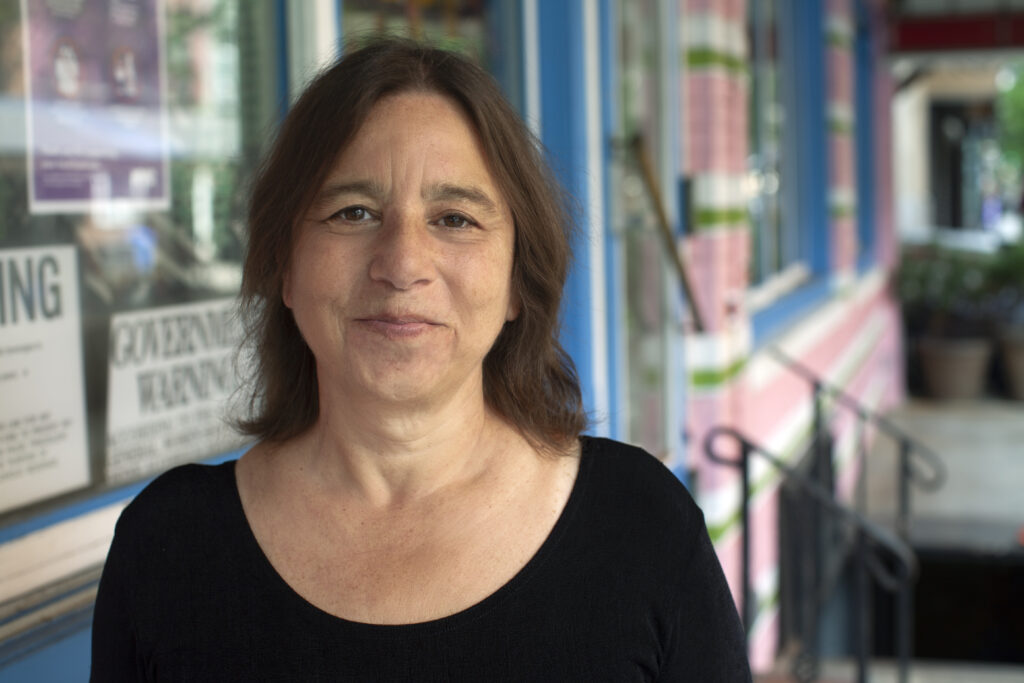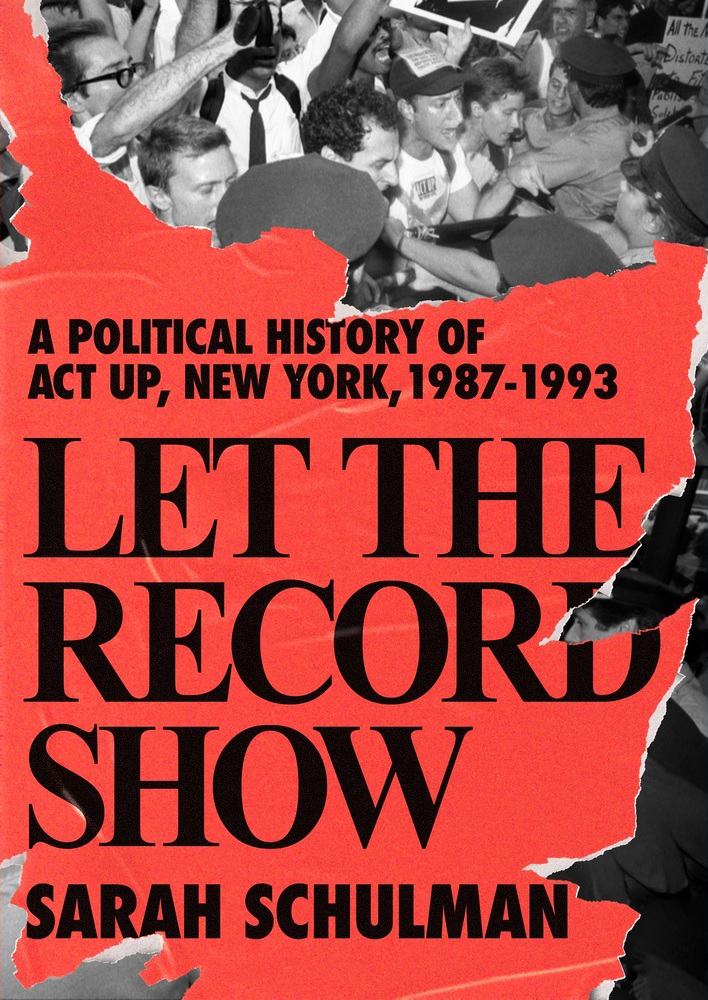Author Sarah Schulman nominated for prestigious award
Sarah Schulman’s new book Let the Record Show: A Political History of ACT UP New York, 1987-1993 has been nominated for a prestigious award.
PEN America has announced the finalists for the 2022 PEN America Literary Awards, with 54 authors and 11 translators recognized for works of fiction, nonfiction, poetry, biography, essay, science writing, translation, and more published in 2021. Schulman is one of five authors nominated for the PEN/John Kenneth Galbraith Award for Nonfiction.
Sarah Schulman’s massive new book, Let the Record Show: A Political History of ACT UP New York, 1987-1993. Her book illumines—through a lens that has nothing to do with the corporate takeover of Pride parades or the demand for respectability politics that doesn’t want leather or topless dykes on bikes at Pride—what LGBTQ activism is capable of.
Reading Schulman’s book felt like taking a trip into the most visceral years of my own activist and journalistic life. Let the Record Show took me back to people, places, actions, urgency. It took me to a place of rage. It took me to pain and suffering. It took me to deep, keening loss. And in the end—in a shocking plot twist—it brought me to a place of hope and renewal. Reading Let the Record Show, as another pandemic rages globally, was like reading a ghost story. Eerily, even some of the main players—like Dr. Anthony Fauci—remain the same. But as ACT UP member Jim Eigo says in the book, “It was the most splendid idea of community I’ve ever been a part of.”

At more than 700 pages, Let the Record Show is daunting. Yet the book reads not like a dry dissertation on a political action group—the AIDS Coalition to Unleash Power—but like a queer Russian novel, with hundreds of characters, myriad interwoven stories, a series of cataclysmic actions and concomitant dénouements, climaxes and anti-climaxes. It is War and Peace, with the war ongoing. It is Anna Karenina with Karenina walking away from the tracks, an undaunted survivor. The foundation for Let the Record Show is an extraordinary number of interviews—188—with some of the hundreds of people who were involved in ACT UP New York from its inception in 1987 to its waning days in 1993. These interviews, conducted over 17 years with filmmaker Jim Hubbard, are an irreplaceable piece of queer history. (Parts of these interviews, as well as archival meeting and protest footage, are included in Hubbard’s 2012 documentary, United in Anger: A History of ACT UP, which is available at Amazon Prime and Apple TV.) It is a history that Schulman herself was part of and about which she has been writing as a novelist, essayist and playwright, for decades. Her novels Rat Bohemia and People in Trouble are tales from the viscera of the AIDS epidemic. At one point in Rat Bohemia, one of the central characters, David, a writer dying of AIDS, says, “They’re glad we’re dying….Really, they’re relieved.” He’s talking about families of people with AIDS, but his words resonate: That is how mainstream society viewed the death and dying of so many gay men.
In Let the Record Show, Schulman writes about activist writer Michael Petrelis standing on a pew in St. Patrick’s Cathedral in New York in a huge—7,000 people—and famous ACT UP action in 1989. Petrelis yells, “You’re killing us!” as scores of other activists lay down on the floor of the church, in one of the most provocative of many ACT UP die-ins. Let the Record Show is, at its core, about the dichotomy between the world that recognized AIDS and the world that didn’t. Those of us who saw it, who were desperate to save lives, who knew the dying—not just Rock Hudson out in public, but people we loved and who loved us back—we were living as if in bloodied foxholes with incendiary devices exploding all around us. As an AIDS reporter for both the gay and mainstream press from the earliest days of the epidemic and as an AIDS activist in Philadelphia and New York, ACT UP was part of my own life for years. Schulman brings those cacophonous Monday night meetings at the Gay and Lesbian Community Center, and later, at Cooper Union, vividly, poignantly, angrily to life. Readers will see those meetings as they happened, as they evolved, the splinter groups and the main players, the deliberate lack of hierarchy and ownership of ideas, as they led to political action that changed, well, everything.





In the years Schulman covers, I was an AIDS columnist for SPIN magazine and a reporter for OutWeek and The Advocate. I wrote about AIDS for the Village Voice, the Philadelphia Inquirer, the Philadelphia Gay News and other publications. I was holding abandoned AIDS babies at Montefiore Hospital in the Bronx, interviewing Black residents of a little town called Belle Glade, Florida where there was a confusing cluster of cases, sitting down with U.S. Surgeon General C. Everett Koop, AIDS researcher Dr. Sam Broder and holding the hands of people with AIDS dying in hospice care, attended by people terrified of their disease who treated them not with compassion, but with revulsion and scorn. And throughout I was visiting friends in hospital and attending and speaking at a relentless flood of funerals and memorial services. The lines between reporter and activist were blurred by the knowledge that people we knew were dying every day and all we could hope to do was staunch the hemorrhaging. Schulman captures that era with a stenographer’s accuracy, an activist’s avidity and a novelist’s sense of nuance and drama. She takes the reader through the evolution and revolution that was ACT UP/NY, delving deep into the internecine actions that were happening in and around the organization, unafraid to critique problems and concerns.
Schulman details the gargantuan impact of ACT UP and how countless lives were saved by that organization. ACT UP influenced Big Pharma as well as medical research. It augured changes in insurance policies, helped create needle exchange programs, recognized women as another group dying of the disease. ACT UP got Fauci on our side. Starting with the preface, Schulman provides the context and the characters that have been missing from the telling of the AIDS activist story that has so often centered a white male savior palatable and sympathetic to straight audiences. She pillories that point of view found in Oscar-winning film, Philadelphia, Tony-winning play Angels in America, and David France’s How to Survive a Plague. Schulman writes, “AIDS activist history has been mistakenly placed in the trajectory of gay male history.” She decries AIDS as metaphor rather than what it was in real time: AIDS allowed to run rampant as a form of genocide while politicians ignored the carnage. The parallels to our current political crises could not be more clear. More than 30 years before Donald Trump was tear-gassing peaceful Black Lives Matter activists in Lafayette Square, I was being loaded into a police van in front of the White House in a peaceful protest against Ronald Reagan’s refusal to acknowledge the AIDS epidemic. The police who arrested us wore blue gloves, afraid of getting AIDS from their proximity to us. ACT UP led that protest.
The framing of this history Schulman tells is new. Women and people of color have been largely elided and erased from AIDS activist stories; Schulman explores how AIDS activism culled from the Black Civil Rights movement and the feminist movement, among others; women and people of color were very much a part of the action. As Schulman states, “It is very unusual for movements or groups that are dominated by men and white people to achieve transformational victories that improve the lives of women, people of color and poor people.” ACT UP was populated by many people from historically marginalized groups, notably women, and did achieve transformational change and very real victories. Let the Record Show is so vividly imagined and so provocatively organized, it should spur every reader to activism. It’s that powerful. Schulman’s is the one book every LGBTQ person should be reading during Pride: It is a manifesto.

CATCHING UP WITH SARAH SHULMAN
Why did you choose to write this history? You and Jim Hubbard did the oral history project–was this book always a planned part of that?
I started writing about AIDS in the early 1980s, and by the time ACT UP started in 1987 I had already been reporting for five years. I joined ACT UP in July 1987 and Jim Hubbard and I started the ACT UP Oral History Project in 2001 and conducted 188 interviews over 18 years. We looked for someone else to write the book but were not successful. When the mis-historicization became prominent, we felt it was a state of emergency and so I agreed to do the book, which at that point took about 3 years, even though I had conducted most of the interviews.
One of the points that repeats throughout the book and which is addressed in the title itself is how women and people of color have been elided from the history of the history of the AIDS movement and AIDS activism. Can you talk about why you chose to make this a focal point?
I would not put it that way. The ahistorical focus has been on a handful of white male individuals—but there were many more white men, women and people of color creating the movement, and its eventual paradigm shift. I did not foreground women or people of color or unrepresented white men, I simply said what all these people actually did. And of course it is not exhaustive. The book could have been twice as long.
The book has particular resonance as we are still in the midst of a global pandemic. Did you feel that connection between pandemics while the book was heading into publication or are we wrong to make that connection?
I submitted the manuscript before Covid, so I was not thinking about Dr Fauci, for example. And his repeated representation by activists as someone who never said yes to the innovation, but always had to be persuaded, emerged inadvertently. Covid is a collective public event, and AIDS was a private nightmare, kept out of the public conversation. It was our goal to force AIDS into the light of day.
The book has a very poignant and surprising ending–how is your health?
I have a somatic gene mutation called Jak-2 which is progressive and cannot be cured, and I have some related but unclear how, cell reproduction issues. However, I am doing very well, I have the right level of medications and do regular maintenance. It is a constant presence but for now I am doing great.

Sarah Schulman appears at the virtual LGBT Center on June 8 at 6:30pm in conversation with activist Steven Thrasher. Register for the conversation at https://gaycenter.org/schulman-thrasher/registration/.





